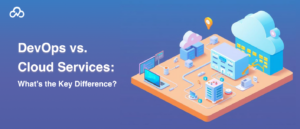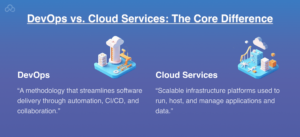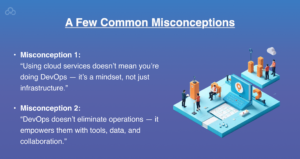DevOps vs. Cloud Services: What’s the Key Difference? 
In today’s fast-paced digital era, businesses are under regular pressure to innovate, scale, and deliver better software quickly. To fulfill such demands, the two terms often come into the picture which is- DevOps and Cloud Services. As they might sound similar or even complementary but they serve very different purposes. Understanding the key differences between DevOps vs cloud services is important, especially for the businesses considering DevOps consulting and managed services. In this blog, we’ll break down both terms into cloud computing vs DevOps and will highlight how they work, and help you decide how to best use them in your business concept.
What is DevOps?
DevOps is a process that brings two teams together – software developers (Dev) and IT operations (Ops). The main aim is to let these two work closely as one team to build and produce software faster and more reliably.
It’s not only about software but it’s also about a culture of teamwork which is dependent on constant improvement, and sharing feedback. DevOps uses stuff like automation for regular testing, and continuous updates (CI/CD) to keep things running smoothly. In short, it’s all about making better software easily, without hindering things along the way.
For example, with a DevOps strategy, development teams can create code more frequently, while operations teams can monitor and maintain environments with less downtime. The use of automation tools like Jenkins, GitLab CI, and Terraform fasten the processes and ensure consistency across the system.
What are Cloud Services?
Cloud services, on the other hand, defines the delivery of computing resources like storage, servers, databases, networking, and software over the internet. These services are provided by cloud vendors such as Amazon Web Services (AWS), Microsoft Azure, and Google Cloud Platform (GCP).
Cloud computing allows businesses to scale up their resources or down based on the situation, pay only for what they consume, and avoid the capital costs of maintaining physical infrastructure.
There are three primary models of cloud computing:
- Infrastructure as a Service (IaaS): Offers raw computing resources (e.g., AWS EC2).
- Platform as a Service (PaaS): Provides a platform to develop, run, and manage apps (e.g., Google App Engine).
- Software as a Service (SaaS): Delivers software applications over the internet (e.g., Salesforce, Google Workspace).
DevOps vs. Cloud Services: The Main Difference
The major difference between DevOps and cloud services is their focus and functionality.
DevOps is a cultural and procedural concept to software development and IT operations. It’s about optimizing the process of software building, testing, and delivering through collaboration, automation, and iterative improvement.
DevOps introduces practices like CI/CD, Infrastructure as Code (IaC), continuous testing, and continuous monitoring. Its main goal is to improve agility, reduce deployment times, increase release frequency, and make better cooperation between traditionally siloed teams.
Cloud services, in contrast, are the platforms or infrastructures delivered by third-party providers over the internet. These services supply the computer system power, storage, and networking capabilities which are required to host applications and manage data. Businesses use cloud services to offload infrastructure management to achieve elasticity in operations, and ensure high availability.
To simplify this, think of devOps as a service or way of process, while cloud services are the resources that support that process. You can use DevOps in an on-premises environment, though it becomes far more efficient and scalable when combined with cloud services. Likewise, using the cloud without DevOps practices can limit your agility and speed of software delivery.
Suppose, a software team that gives out updates weekly. Without DevOps, they might manually test and implement every change which results in delays or bugs. If they use cloud services, they get the benefit of scalable infrastructure but the lack of automation or collaboration will still slow them down. Now, DevOps: CI/CD automates deployments, testing frameworks to catch the issues early, and monitor the tools and provide real-time insights. Combined with cloud elasticity, they can now use multiple times a day, scale during peak usage, and respond quickly to issues.
The linkage between DevOps and cloud is very crystal clear. Cloud services provide the foundation, while DevOps delivers the process optimization. Together, they can help businesses to achieve speed, efficiency, and resilience in delivering digital services.
Ultimately, businesses don’t need to choose between DevOps and cloud services. The play lies in their integration. Companies looking to modernize should consider how DevOps consulting and managed services can help this integration to help them build scalable, automated, and collaborative environments that support their continuous innovation.
How DevOps and Cloud Work Together
While DevOps and cloud services are clear, they are most powerful when used as one. Together, they form a symbiotic relationship that enables businesses to build, deploy, and scale the software faster, more reliably, and with good control over costs and infrastructure.
DevOps focuses on agility, automation, and continuous delivery. But, achieving these goals in a basic IT environment can be challenging due to the limitations of fixed infrastructure. That’s where cloud services come in. Cloud platforms like AWS, Azure, and Google Cloud offer customized resources like scalability, and automation capabilities that perfectly match with DevOps practices. For instance, monitoring a new server in the cloud can be done in seconds using Infrastructure as Code (IaC) tools such as Terraform or AWS CloudFormation. Which would take hours or days in the older ways.
DevOps automation tools like Jenkins, GitLab CI/CD, and Ansible integrate smoothly with cloud services, allowing pipelines to automatically change up environments by deploying builds, run tests, and scale applications based on load. This smooth integration means that DevOps practices have become more efficient, more dynamic, and less stressed by physical hardware limitations.
Likrwise, Airbnb uses DevOps principles on Amazon Web Services to maintain fast feature delivery. Their engineers use multiple times per day which is backed by robust monitoring and auto-scaling cloud infrastructure that supports global demand. Their ability to handle sudden traffic spikes – say during a major travel season- is enabled by cloud flexibility, while DevOps make sure these spikes don’t break the system.
Cloud providers themselves support DevOps previously. Services like AWS CodePipeline, Azure DevOps, and Google Cloud Build offer prebuilt integrations like dashboards, and security compliance, helping the teams to adopt best practices without changing the wheel.
In summary, cloud makes DevOps wider, faster, and flexible. DevOps, in return, makes cloud investments more effective by smoothing the development and operations. This linkage allows businesses to innovate quickly to respond to the market demands faster, and maintain high application reliability and best of all while optimizing infrastructure costs.
Real-World Example: Netflix
Netflix is a live example of DevOps and cloud working together. The company migrated from its physical data centers to AWS to get scalability and reliability. With DevOps practices, it was able to automate everything from code integration to deployment. Netflix engineers use Spinnaker (a CI/CD tool) for releasing changes, and Chaos Monkey (a testing tool) to ensure the system’s resilience. This fine integration between DevOps practices and cloud infrastructure helped Netflix to use code thousands of times daily with zero downtime.
Real-World Example: Etsy
Etsy the popular american ecommerce platform faced severe challenges in pushing code and maintaining system stability. By implementing DevOps and moving to cloud infrastructure, Etsy made CI/CD pipelines, automated testing, and monitoring tools. It improved deployment frequency from once every two weeks to multiple times daily. With the help of cloud, they could now scale up for peak traffic periods and optimize costs during slower times.
Real-World Example: Capital One
Capital One’s DevOps transformation is used all over. They moved to AWS and adopted devOps as a service internally. Developers were given more autonomy to push code, infrastructure was managed as code, and security practices were integrated early in the pipeline (DevSecOps). And the result? Faster releases, fewer bugs, and improved customer experience. Sounds amazing right?
Use Cases: DevOps Consulting and Managed Services
Implementing DevOps or managing complex cloud environments is not a cup of tea for all the businesses as many businesses don’t have the in-house expertise to. That’s where DevOps consulting and managed services come into play. These services help businesses to set up CI/CD pipelines, automate infrastructure, migrate to the cloud, and build feedback loops for continuous improvement.
For example, if a retail startup in Boston collaborated with a DevOps consulting firm to switch its e-commerce platform from on-premise to Google Cloud. The consultants were introduced to GitOps workflows which helped establish monitoring with Prometheus and Grafana, and created a self-service deployment platform. Within months the release cycles went from days to hours, and uptime improved surprisingly.
DevOps as a Service (DaaS)
DevOps as a Service is a model where a third party manages the DevOps lifecycle on behalf of a business. This includes CI/CD pipelines like testing automation, infrastructure provisioning, and monitoring.
Real-life Scenario: In Texas a healthcare SaaS company lacked automation and used manual testing and deployment processes. By using DaaS, they integrated Jenkins pipelines which automated their testing using Selenium, and provisioned environments using Terraform on AWS. Release times reduced by 60%, and deployment-related issues reduced drastically.
DevOps Cloud Integration
Another area where cloud computing vs devops converge is in DevOps cloud integration. This refers to fixed devops managed services strategies directly into cloud tools and workflows which create a streamlined and efficient development-to-deployment process. Cloud platforms like Microsoft Azure, AWS, and Google Cloud are built with DevOps integration in mind, offering a range of services that align perfectly with DevOps practices.
For instance, Azure DevOps consulting and managed services integrate smoothly with Azure Kubernetes Service (AKS), Azure Pipelines, and GitHub Actions. This integration helps the teams to manage source code like build CI/CD pipelines, and deploy applications into containerized environments all within the Azure ecosystem. Likewise, AWS also offers services like CodePipeline, CodeBuild, and Elastic Beanstalk, which support continuous delivery and infrastructure automation.
The benefits of DevOps cloud integration are amazing. Businesses get the ability to rapidly provision new testing or production environments to make it easier to iterate and innovate. When something goes wrong, integrated monitoring and logging tools allow teams to identify the issues quickly and roll back to deployments with minimal downtime. This agility is essential for businesses operating in fast-changing markets.
Think about a global e-commerce company running its entire infrastructure on AWS. By integrating DevOps pipelines into AWS services, the company can deploy new features daily, and test them in isolated cloud environments, and also monitor the user feedback in real time. When a deployment fails, rollback automation ensures that services remain uninterrupted. Cloud elasticity also ensures that these deployments can scale with demand, whether during Black Friday sales or regular user spikes.
Furthermore, DevOps cloud integration promotes better collaboration. Developers, testers, and operations teams can all work within a single, shared environment with clear roles and automation backing their workflows. This minimizes communication gaps and maximizes output.
In essence, DevOps cloud integration is the convergence of agile software practices with modern cloud capabilities. It empowers teams to deliver better software, faster, while maintaining security, stability, and cost-efficiency. Companies embracing this model are more adaptable, innovative, and prepared for the digital future.
A Few Common Misconceptions
One common misconception is that using cloud services literally means you are doing DevOps. While cloud platforms enable faster deployment and scalability, DevOps is a mindset and methodology. You can be fully in the cloud and still operate in a traditional waterfall model. Similarly, you can implement DevOps practices on-premises if the culture and tools support it.
Another myth is that DevOps consulting and managed services eliminates the need for operations teams. In reality, DevOps empowers operations with better tools, data, and collaboration models. Instead of being reactive, ops teams have become proactive partners in software delivery.
Conclusion
DevOps and cloud services are not mutually related, they are complementary. DevOps brings agility, automation, and collaboration to the software development process. Cloud services provide the foundation that makes devOps managed services possible at scale.
For businesses which aim to grow in the digital age, the key is to not choose between DevOps and cloud services. But it’s about integrating both of them effectively. Whether you choose DevOps consulting and managed services or build capabilities in-house, the combination of cloud computing and DevOps principles can transform how you build, deliver, and maintain software.
So, the difference and the bondage between DevOps and cloud services is as important as taking a tea break in the office for creating a future-proof IT strategy. The way you plan your digital transformation just try to think beyond the tools. And focus on the processes, people, and the platforms that will make sustainable innovation.
Do you like to read more educational content? Read our blogs at Cloudastra Technologies or contact us for business enquiry at Cloudastra Contact Us

